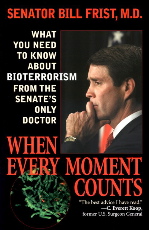Thursday, April 01, 2004
The Trifecta?
Three stories from today's WaPo:
1.
1.
Top Focus Before 9/11 Wasn't on Terrorism2.
Rice Speech Cited Missile Defense
On Sept. 11, 2001, national security adviser Condoleezza Rice was scheduled to outline a Bush administration policy that would address "the threats and problems of today and the day after, not the world of yesterday" -- but the focus was largely on missile defense, not terrorism from Islamic radicals.
The speech provides telling insight into the administration's thinking on the very day that the United States suffered the most devastating attack since the 1941 bombing of Pearl Harbor. The address was designed to promote missile defense as the cornerstone of a new national security strategy, and contained no mention of al Qaeda, Osama bin Laden or Islamic extremist groups, according to former U.S. officials who have seen the text.
The speech was postponed in the chaos of the day, part of which Rice spent in a bunker.
---
The text also implicitly challenged the Clinton administration's policy, saying it did not do enough about the real threat -- long-range missiles.
---
In the speech prepared for Sept. 11, Rice intended to point out that the United States had spent $11 billion on counterterrorism, about twice as much as it spent on missile defense, during the previous year, although the speech did not point out that that was when President Bill Clinton was still in office.
Rice's text noted that Bush appointed Cheney to oversee a coordinated national effort to protect against a terrorist attack using weapons of mass destruction. At the time, the U.S. concern about terror was heavily focused on Iraq and rogue states, and missile defense was viewed as a weapon against that terrorism -- a different interpretation of the leading threats and responses that would take hold after jetliners hit the World Trade Center and Pentagon.
Bush Counsel Called 9/11 Panelist Before Clarke Testified3.
President Bush's top lawyer placed a telephone call to at least one of the Republican members of the Sept. 11 commission when the panel was gathered in Washington on March 24 to hear the testimony of former White House counterterrorism chief Richard A. Clarke, according to people with direct knowledge of the call.
White House counsel Alberto R. Gonzales called commissioner Fred F. Fielding, one of five GOP members of the body, and, according to one observer, also called Republican commission member James R. Thompson. Rep. Henry A. Waxman, the ranking Democrat on the House Government Reform Committee, wrote to Gonzales yesterday asking him to confirm and describe the conversations.
---
Thompson declined yesterday to say whether he spoke with Gonzales. "I never talk about conversations with the White House," he said. Asked about the source of his information for his questioning of Clarke, Thompson said: "I ask my own questions."
---
Thompson, a former Illinois governor, pointed to Clarke's remarks praising Bush in a previously anonymous 2002 news briefing. It was reported on Fox News two hours before the hearing started; the White House that morning had authorized Fox News to identify the anonymous briefer as Clarke.
Most Say They Are Less Safe Since 9/11
Fewer than half of all Americans think the country is safer now than it was on Sept. 11, 2001, and more than three-quarters expect the United States to be the target of a major terrorist attack at home or abroad in the next few months, according to a new poll.
---
The poll found the most feared types of attacks were bioterrorism, cited by 48 percent of respondents,

and chemical weapons, cited by 37 percent. Suicide bombings, a much more commonly employed tool of terrorists around the world, were mentioned by 21 percent.


